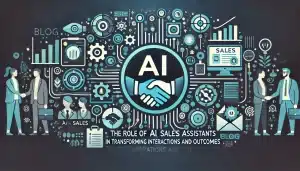Artificial Intelligence (AI) has revolutionized various industries, and one area where its impact is particularly significant is in sales. AI sales assistants are playing a crucial role in transforming customer interactions and outcomes. In this article, we delve into how AI enhances customer interactions, the importance of AI in the sales process, how AI improves customer experience, the benefits of using AI in customer support, and how businesses can leverage AI for sales enablement.
How Does AI Enhance Customer Interactions?
AI is being utilized for personalized recommendations, enhancing customer service through AI chatbots, and improving customer engagement with AI-driven insights. By harnessing AI technologies, businesses can offer tailored suggestions to customers based on their preferences and behaviors. AI chatbots provide instant support and information to customers, enhancing their overall experience. Insights generated by AI algorithms help businesses understand customer behavior better, enabling them to engage customers more effectively.
Moreover, AI can analyze vast amounts of data in real time, identifying patterns and trends that humans might overlook. This capability allows businesses to anticipate customer needs and deliver proactive solutions. For instance, if an AI system detects that a customer frequently buys a specific product, it can recommend complementary items or notify the customer about upcoming sales and promotions related to their interests. Such personalized interactions not only enhance the customer experience but also foster loyalty and repeat business.
What Is the Importance of AI in the Sales Process?
AI plays a vital role in enhancing sales team efficiency with AI solutions, integrating AI to analyze customer data for sales optimization, and enhancing customer relationships. By incorporating AI tools, sales teams can streamline their processes, identify potential leads, and optimize their sales strategies. Analyzing customer data using AI helps businesses tailor their sales approach to meet customer needs effectively. Furthermore, AI contributes to building stronger customer relationships through personalized interactions and insights into customer preferences.
AI can also automate routine tasks such as data entry, scheduling meetings, and following up with leads, freeing up sales representatives to focus on more strategic activities. This automation not only improves efficiency but also reduces the risk of human error. Additionally, AI can provide sales teams with real-time insights and recommendations, helping them make informed decisions quickly. For example, AI can analyze a lead’s engagement history and suggest the best time to contact them or the most effective communication channel to use.
How Can AI Improve Customer Experience?
- Personalized Interactions: AI enables businesses to offer personalized services and recommendations, creating a memorable experience for customers.
- Predicting Customer Behavior: AI analyzes customer behavior to forecast future actions, allowing businesses to anticipate customer needs effectively.
- Enhancing Satisfaction & Loyalty: AI-driven solutions cater to individual customer preferences, boosting satisfaction and fostering long-term loyalty.
- Omnichannel Experience: AI provides seamless and consistent interactions across multiple platforms (online, mobile apps, physical stores), ensuring a cohesive experience.
- Faster Response Times: AI helps businesses respond to customer inquiries faster and more accurately, reducing wait times and improving overall satisfaction.
- Continuous Learning: AI systems adapt and improve over time by learning from customer interactions, offering more relevant and valuable experiences.
What Are the Benefits of Using AI in Customer Support?
Using AI-powered systems transforms how businesses handle customer inquiries, improves customer satisfaction through efficient AI-driven responses, and enhances customer loyalty with personalized AI support solutions. AI streamlines customer support operations by providing quick and accurate responses to inquiries, ensuring a positive customer experience. Personalized AI support builds customer trust and loyalty, leading to long-term relationships and repeat business.
AI can also handle a large volume of inquiries simultaneously, reducing the burden on human agents and ensuring that customers receive timely assistance. Additionally, AI can analyze the content of customer inquiries to identify common issues and suggest solutions, helping businesses improve their products and services. By providing support agents with real-time insights and recommendations, AI can help them resolve issues more effectively and efficiently, further enhancing customer satisfaction.
How Can Businesses Leverage AI for Sales Enablement?
By implementing AI in the sales process for improved efficiency, utilizing AI models for predictive sales analytics, and highlighting the impact of AI applications on customer engagement and revenue growth, businesses can boost their sales enablement strategies. AI helps businesses automate tasks, forecast sales trends, and drive revenue growth through enhanced customer engagement. Predictive analytics powered by AI provide valuable insights that assist in making informed sales and marketing decisions, ultimately improving business performance.
Moreover, AI can enhance cross-selling and upselling efforts by identifying customer patterns and preferences, allowing sales teams to offer relevant products and services. AI-driven tools can also help in identifying market trends and competitive insights, enabling businesses to stay ahead of the competition. By leveraging AI for sales enablement, businesses can create more targeted and effective sales strategies, improve customer engagement, and achieve sustainable growth in an increasingly competitive market.
Conclusion
AI is undeniably transforming the landscape of sales and customer interactions. By enhancing personalization, streamlining processes, and providing deep insights into customer behavior, AI enables businesses to offer superior customer experiences and achieve significant operational efficiencies. From automating routine tasks to providing real-time recommendations, AI empowers sales teams to focus on strategic activities that drive growth and customer satisfaction. As AI technologies continue to evolve, businesses that embrace these innovations will be better positioned to stay ahead of the competition and meet the ever-changing needs of their customers. The future of sales lies in the intelligent integration of AI, making it an indispensable tool for driving business success.
FAQs:
Q1. How does AI enhance customer interactions?
A. AI enhances customer interactions by offering personalized recommendations, using chatbots for instant support, and providing data-driven insights into customer behavior. These interactions are tailored to individual preferences, fostering stronger customer relationships and increasing engagement.
Q2. What is the importance of AI in the sales process?
A. AI improves sales efficiency by automating routine tasks, analyzing customer data for better insights, and helping sales teams optimize their strategies. It enables personalized sales approaches and streamlines lead management, ultimately improving sales outcomes and customer relationships.
Q3. How can AI improve customer experience?
A. AI improves customer experience by personalizing interactions, predicting customer behavior, enhancing satisfaction and loyalty, and providing a seamless omnichannel experience. It also enables faster response times and continuous learning from customer interactions to improve services.
Q4. What are the benefits of using AI in customer support?
A. AI benefits customer support by automating responses, improving efficiency, and providing personalized solutions. It handles high volumes of inquiries simultaneously, supports agents with real-time insights, and ensures quicker, more accurate resolutions, leading to increased customer satisfaction and loyalty.
Q5. How can businesses leverage AI for sales enablement?
A. Businesses can leverage AI for sales enablement by automating tasks, forecasting sales trends, and using predictive analytics for data-driven decision-making. AI helps optimize sales strategies, enhances customer engagement, and drives revenue growth through targeted recommendations and insights.




